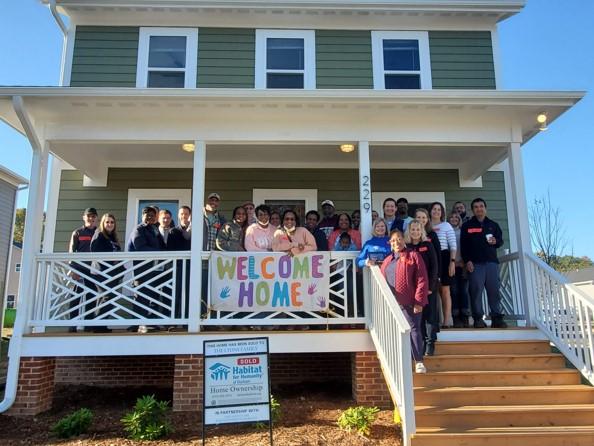Habitat House Dedicated, Microaggressions and Their Aftermath

Congratulations to Dr. Morgenlander, Dr. Johnson, and everyone who contributed to the recently dedicated Habitat for Humanity House. What a great show of support for our community!
________________________
As we continue to build relationships with our community, there are two events coming up to help build bridges with NCCU. The first is this Wednesday at Grand Rounds, when Dr. Alex Marshall from NCCU will be speaking on the neurobiology of alcohol addiction. This is the first of our planned annual guest lectures from the NCCU neuroscience and neurobiology group.
The next event is still in the early planning stages, but I wanted to send an early Save the Date for April 29, 2023. The D&I Committee, spearheaded by Ashley Moore, our NCCU Liaison, is planning a neurology and neuroscience career day for NCCU undergrads to be held at the JB Duke Hotel. These details might still change as we are still looking to secure our funding and space, but as soon as we lock this in, we will be recruiting faculty, APPs, and trainees to participate as speakers, panelists, and mock interviewers. Stay tuned for more information on this in the coming months.
________________________
This coming weekend will mark the beginning of Diwali celebrations (officially observed on Monday). I wish everyone celebrating a happy Diwali!
_______________________
I’ve dedicated space in these monthly emails to dealing with microaggressions several times in the past, but I wanted to take a moment to focus on the aftermath of experiencing a microaggression. Once the moment has passed, it’s not over. In fact, a person who has been the recipient of a microaggression is often less able to focus on work afterwards, as the event is continually replayed in their mind. While we often hear about what a bystander might do if they witness the event, we don’t typically talk about how to respond when a friend or colleague tells you that they experienced a disturbing event that you did not witness. Here are some tips for what you should and should not do in this setting.
First, be a good listener. Let the recipient of the microaggression tell their story without interruption. When you do respond, it should be with empathy: “I’m so sorry that you experienced that.” And you can offer to help. Sometimes, an ear and moral support is all that’s needed in the moment. Most importantly, believe what you’re being told. Don’t make excuses or try to explain why the recipient of the microaggression might have misinterpreted the situation. Don’t make them doubt their own reality. This only adds to the cognitive burden that experiencing a microaggression induces.
There are several other things not to do in this setting. Please don’t try to break the tension with humor. While hearing about a microaggression might make you uncomfortable, resist the urge to change the subject by making people laugh. Most likely they won’t, and you’ll make the situation worse by appearing to not take the event seriously. Another thing to avoid is the urge to play the hero. You don’t need to be responsible for fixing a problem just because your friend or colleague is telling you about one. This doesn’t necessarily apply if you’re a supervisor.
Providing empathy and validation are your primary objectives as a friend or colleague when learning about a microaggression after the fact.
________________________
